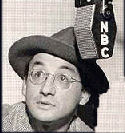 “Immortal Gentleman” aired on Lights Out, June 14, 1939. Lights Out (1934-1947) was radio’s premier horror series. It was created by writer/director Willis Cooper, who would later pen the script for the Boris Karloff horror film Son of Frankenstein (1939). Lights Out set the standard for other macabre radio dramas in the 1930’s primarily for its gory sound effects and (over the series’ run) weirdness. A year after its inception, Lights Out became a sensation when it was taken over by the young man who would become one of old time radio’s most talented and prolific writers/producers, Arch Oboler (pictured at right).
“Immortal Gentleman” aired on Lights Out, June 14, 1939. Lights Out (1934-1947) was radio’s premier horror series. It was created by writer/director Willis Cooper, who would later pen the script for the Boris Karloff horror film Son of Frankenstein (1939). Lights Out set the standard for other macabre radio dramas in the 1930’s primarily for its gory sound effects and (over the series’ run) weirdness. A year after its inception, Lights Out became a sensation when it was taken over by the young man who would become one of old time radio’s most talented and prolific writers/producers, Arch Oboler (pictured at right).
[It is absolutely crucial of mention here that Arch Oboler was, in the 1940s, one of the highest paid writers in the world and the most successful radio playwright in America. He was NBC radio’s “boy genius,” and rivaled Orson Welles in prestige and critical acclaim. His genius influenced many, including Rod Serling’s original The Twilight Zone. Oboler either wrote or directed (or both) numerous well-received, classic radio series’ during his phenomenal career {far too many to mention here}, and his creative impact was felt far beyond radio. “Immortal Gentleman,” while relatively early Oboler, yet remains one of his conceptual best in the SF arena. Among old time radio aficionados Arch Oboler is an iconic name, much as are Robert A. Heinlein, Ray Bradbury, Isaac Asimov, and Arthur C. Clarke in the science-fiction world. His immense production over the years in diverse genres, not to mention the generally acknowledged high quality throughout, mark Arch Oboler as one of Old Time Radio’s true giants. Arch Oboler was born in the United States in 1904 and died in the United Kingdom in 1978.]
“Immortal Gentleman” deals with a small group of immortals–one of whom, because of a random genetic defect–is unaware of his privileged status. As he learns about himself at a clandestine meeting of his brethren, he learns of a plot to which he is forced to be an unwilling participant. This bold scheme forces him to consider what it means to live forever, ageless and disease-free, virtually a genius…but with nothing to do. In several sequences (reminiscent of Philip K. Dick’s yet unwritten works dealing with the same theme), our “Immortal Gentleman” experiences several jarring identity crises as he finds himself first in one reality and then inexplicably in another…one of which is the far future, where the plot takes a number of twists that eventually determine his unexpected course of action; the whole serving to illuminate several timeless questions as only science-fiction can.
While America listened to this thoughtful drama of immortality in the summer of 1939, with the sound of war drums in Europe mocking the concept (Germany would invade Poland on Sept. 1st), SF fans were reading stories in the SF pulps such as L. Sprague de Camp’s “The Gnarly Man” (Unknown, June), A. E. van Vogt’s classic “Black Destroyer” and Isaac Asimov’s “Trends” (both from Astounding Science Fiction, July), and last but not least Robert A. Heinlein’s first published story “Life-Line” (ASF, August). Notable novels (serialized in the magazines) from 1939 include Lest Darkness Fall by L. Sprague de Camp, One Against the Legion by Jack Williamson, and Grey Lensman by E. E. “Doc” Smith. 1939 also saw the first World Science Fiction convention held in New York, the same summer as the famous, futuristic-themed New York World’s Fair.
Lights Out‘s signature opening line is famous, with an eerie gong separating the haunting words, “It…is…later…than…you…think.”
Play Time: 24:11